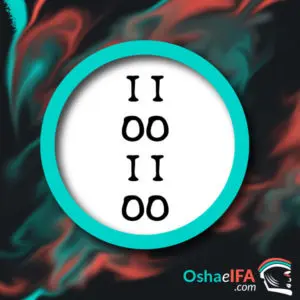Oshe Niwo (Oshe Ojuani)

Oshe Niwo (Oshe Ojuani) is Odu number 232 of the Lordly Order of Ifá. This sign reveals the human tendency towards duplicity, highlighting how people often pretend to be something they are not in order to achieve their goals. This ability to deceive is seen as a manifestation of cunning, but also as a reflection of the ethical complexities in human interactions.
Analysis and Interpretation of the Sign Oshe Niwo (Oshe Ojuani)
Oshe Niwo is an Odu who tells us about the duality and complexities of the human character, highlighting the presence of hypocrisy, lies and demagoguery. It is essential for people ruled by this sign to maintain a high level of self-awareness and care in their interactions.
Economic Aspects:
Oshe Niwo warns about the power and danger of greed. He advises prudence and honesty in financial transactions, as the lack of these can lead to legal problems and significant losses. This Odu also indicates that there can be gains through inheritance or unexpected means, as long as one acts with integrity.
Health:
This sign speaks of diseases transmitted by viruses or bacteria, and problems related to pollution or unhealthy surroundings. Extreme caution is suggested with what is consumed and the handling of medications. It is vital for physical and mental health to maintain a clean environment and avoid stressful situations that can trigger more serious health problems.
Religious Aspects:
Oshe Ojuani emphasizes the importance of maintaining spiritual commitments and making the necessary offerings to avoid spiritual chaos. The Odu recommends the constant practice of rituals to maintain the connection with the Orishas, especially with Eshu, who plays a crucial role in protecting the individual from negative forces.
Personal relationships:
This Odu reveals that there can be conflicts and betrayals within close relationships. He warns about friends who may appear loyal but have hidden intentions of betrayal. In love, it suggests caution, especially in relationships where one of the partners may not be sincere, which could lead to disastrous consequences. It advises maintaining open and honest communication to strengthen family and love ties, thus avoiding misunderstandings that can lead to breakups or isolation.
General Description of the Oshe Ojuani (Òwónrí) sign
Names or Aliases
- Oshe Ojuani
- Oshe Juani.
- Oshe boron niwe.
- Oshe niwo.
- Òsé Òwónrín
What is born in the Oshe Niwo odu?
- The Palomares.
- Where Osain eats ayá for the first time.
- The evil of individuals who pretend one thing and are another.
- The Ifá of the three knives, one for the godfather, another for Ogun and another for the Awó, because Oshe Niwe killed.
- You need to have obe for power.
- If you are not invited to a ceremony, do not go.
- War arises between the Awó's protective guide and the godfather.
- Eshu Auron gives light in the ilé.
- At Oshe Ojuani the person wants to know more than anyone.
- Orunmila lives with his goddaughter.
What does the Oshe Ojuani sign indicate?
- The inverted obiní visits the house from 2 to 3 in the afternoon.
- When they can't handle one, they go after the children.
- If you are thrifty and organized, you become a millionaire.
- The dead man and the appearance speak.
- The Saint who killed the dog was Abukuo in Odi Roso, when he passed himself off as Diablo.
- The Eweses are: Algarrobo, ewé fa, white pigle.
- Osanyin came down to Earth. He is the Odu Isalaye.
- Ifá brand of hypocrisy, lies and demagogy.
- It speaks of three people who are separated.
- They wanted to kill Orunmila.
- Osanyin must be received.
- You have to take care of the house so that it does not fall apart.
What does the Oshe Niwo sign talk about?
- Oshe Niwo must always have an iron cage in his house with a hutía inside.
- Oshe Ojuani must look at the labels on the bottles or pills of the medicines he takes, because by rushing he can confuse one with another and become poisoned or intoxicated.
- It is crucial to carefully observe what you ingest.
- Oshe Niwo confronts the godfather and, when he has godchildren, they will leave his side in disgust.
- This odu speaks of three people who separate.
- For this odu, Eleguá is put to eat with Egun.
- For this odu, it is necessary to have Ozain. This was where he came down to earth with the ayá leri and ekun leather.
- In Oshe Niwo, both men and women prefer young spouses and, in order not to lose them, they provide them with everything they ask for.
Recommendations of the sign of Ifa Oshe Ojuani (5-11):
- Make appropriate sacrifices: It is crucial for maintaining balance and spiritual protection. It involves offerings to Eshu and Ogun, and possibly participation in specific rituals with OSANYIN.
- Maintain honesty: Since this Odu warns against hypocrisy and falsehood, it is recommended to live and act sincerely.
- Protect the home: Use spiritual protection measures such as washing the house with carob and setting up defense secrets to ensure the stability and security of the domestic environment.
- Attention to reproductive and general health: Particular attention to transmitted diseases and reproductive problems, carrying out the appropriate consultations and treatments.
- Be careful when choosing companies and couples: Avoid relationships that may be toxic or dangerous.
- Listen and act according to dreams: Dreams can offer valuable warnings and guidance.
- Caution with new invitations or environments: Waiting three days before going to a place where you have been invited can prevent bad intentions or ambushes.
Prohibitions:
- Avoid deception and double-facedness: Any hypocritical or deceptive behavior must be renounced.
- Do not ignore spiritual warnings: Neglecting the advice and warnings of Ifá can lead to disastrous consequences.
- Do not engage in witchcraft or black magic practices: This could attract negative energies and spiritual retaliation.
- Restriction on handling multiple relationships: Especially if these involve deception or situations of infidelity.
- Taking medications in the dark is prohibited: This prevents medication errors that can be fatal.
- Do not neglect minors or dependents: Neglecting family responsibilities can lead to loss of luck and serious problems.
- Refrain from disobedient and ungrateful attitudes: These attitudes can distance spiritual guidance and protection.
You can read: Ifa Ojuani Boshe sign
Oshe Niwo Sayings:
- It does not leave one to fall into another.
- If you are not invited, do not go, so that you will not be embarrassed or harmed.
- It is better not to commit than to make promises without keeping them.
- Let no man approach any part of her flesh to reveal her nakedness.
- He denies the food he had and then needs it.
- Help the old man and the beggar, and you will be blessed.
The saying "You don't leave one to fall into another" illustrates how some people seem to jump from one problem to another without respite. It reflects the constant struggle of facing successive challenges, teaching us the importance of resilience and adaptability in life.
Ifa ethical code of odu Oshe Niwo:
- The Awó does not go where he is not invited.
Meaning of the Oshe Niwo sign:
The Ifá sign Oshe Ojuani emphasizes the importance of making sacrifices to restore strength and protection. Anxiety in business matters can be mitigated through spiritual reflection.
Oshe Niwo, the Odu who accompanied osanyin On his descent to Earth, he is known as his Odu Isalayé. This Odu reveals the propensity of people to appear to be something they are not, which allows them to gain knowledge and power.
This Odu is marked by hypocrisy, lies and demagoguery. The Awó of this Odu must always have a caged hutía in his house. Additionally, he must be careful when taking medications in the dark to avoid confusion and possible poisoning.
This Ifá advises making serious promises and commitments with your partner, although these can entail a high cost later. The woman, for her part, maintains an enigmatic and calm relationship, although her actions can transform the man into a diabolical being.
The vanity of parents in choosing partners for their children is criticized and they are warned about the consequences of not settling debts with Eshu.
Orunmila recommends not living with minors to protect the luck and life of the individual. In this sign, if the mother has passed away, it is crucial to perform ceremonies for that Egungun.
To achieve the necessary power, it is essential to offer blood sacrifices to Egungun. Furthermore, religious traps must be avoided and legal protection sought through Kakuarnaldo to consolidate power.
It is essential to establish the secret of Eshu to gain respect in the community. Women with fertility problems should be careful with parasites that may affect their health. Common illnesses in this Odu include infections, viruses, parasites and menstrual problems.
For home purification, it is recommended to clean with carob grass. The Awó of Oshe Niwo, by distancing himself from his godfather, could see how his own godchildren distance themselves from him.
This Odu also predicts love conflicts; A man may find himself involved with three women, which could lead to complicated situations. Caution is suggested to avoid major conflicts.
When this Odu is revealed in a married woman, one should be careful about extramarital relationships that could be dangerous.
Treaty of the Odu of Ifa Oshe Ojuani (Òsé Òwónrí)
In this Odu, Eshu is represented with a dog's head and tiger skin. It is established that Eshu must share food with Ogún. Within the sign of Ifá Oshe Ojuani, it is essential that the Awó begins in Osanyin.
For Shango, dogs are offered in the company of Osanyin and Eshu, and with these elements an Inshé Osanyin is created using a dog's head, carob tree and tiger hair.
This Odu requires offering a rooster to Eshu to prevent unwanted transformations.
When this Odu appears in divination for a pregnant woman, it is interpreted that the child will be son of Elegua.
The woman can fall in love with the Awó and, if she is not careful, she can seduce him. At the conclusion of the reading of Osode, where Oshe Niwo of Odu Toyale is seen, the Awó must give two dry coconuts to the woman, instructing her to offer them to her Guardian Angel.
It is crucial to keep the house in order to avoid deterioration.
Men under this Odu must be alert to possible betrayal by their partners.
A witch or palero could divert the person from Ifá, bringing significant problems to their life and home, including physical damage to the legs, eyes, burns to the body and face.
The Awó of Oshe Niwo must dedicate himself intensely to Ifá.
Often, a person may despise what they eat, only to find themselves needing it later.
Disobedience can lead to your spirit guide abandoning you.
You must pay attention to your dreams and make offerings to the Jimaguas, who are crucial to your well-being.
The ashé of this Odu is composed of cinnamon, incense, rosemary, rue, basil, marjoram, mint, 16 guinea peppers, yam, hutía heart and gandinga, pigeon head, banana, quail and pigeon dove, ingredients used to enhance the spiritual work of the Awó.
In Oshe Ojuani, the first time that Osanyin consumed dogs in the world was recorded.
When this Odu is revealed, it is recommended not to accept invitations until after three days, as there could be a threat to the individual's life.
This Odu is also the origin of the secret ARONI BEBEKUN ONIFA, represented by a doll (Agborán) that always accompanies the Ifá of the Awó, including the secret AYAJUN ARONI BEBEKUN LAYEO, mounted in an ox jar.
Finally, the Awó of this Odu is advised to prepare a garment for his defense and stability.
You can read: Treaty of the Odu Oshe Meji
Says Ifa odu Oshe Niwo
In the Ifá sign Oshe Ojuani, a dominant personality is revealed; The person aspires to surpass others and trusts only in himself. She faces the disloyalty of her godfather and the possibility of her home falling apart due to various intrigues, including love traps. Romantic relationships are under suspicion, and it is warned that you could be called to another place, but first, it is essential to perform an Ebo to avoid adversity.
This individual has faced mobility problems due to a mark on his legs and shows resistance to advice, putting his relationship at risk. In economic terms, you are warned to avoid business during this period as loss is predicted. In health, he faces digestive problems that require spiritual attention through offerings to Eshu and Orunmila.
Ifa advises rejecting gifted tobacco and wearing white to attract luck, especially honoring Oshun, from whom all your blessings come. The importance of charity towards those in need is also emphasized, which will increase your fortune.
Love life presents risks, especially when getting involved with people of the same blood or religious line, which could adversely affect your luck. There is underlying resentment towards his father for leaving home, although a future reconciliation is anticipated.
You can read: Oddun by Ifa Irete Yero
Prayer of the Odu Oshe Niwo:
Oshé Níwe Oshé Boro Níwe Owonrin Níwe Kokoroshe Ewo Oworin Kokore Biaye Eyele, Oshé Moweyo Owonrin Akakalaye Oba Yebi Inu Oni Omo Lala Awo Okuta Awó Lerí Okuta.
Ebboses (Works) by Oshe Niwo:
Ebó by Oshe Ojuani for protection in dreams:
To visualize the actions of enemies during sleep, a special powder is created. This includes: rooster head, carob leaves, dust from a joist or the roof of the house, goat hair, sheep hair, rooster and dove feathers. Everything is crushed until obtaining a fine powder. After praying over this powder on the Ifá board, it is placed in a small bag and placed under the pillow before sleeping.
Work to remove curses:
For this work, a guacalote (a plant known as remover curse) is boiled along with a pointed knife. The individual must bathe with this water. Subsequently, the Godfather must bury both the guacalote and the knife, thus completing the ritual to cleanse the curse.
Patakies (stories) of the Oshe Niwo sign:
The Unexpected Warning
In a village, there lived a farmer who followed Orunmila's advice: every day, upon returning from the field, he sat down to rest and drank a little Sara-ekó fifo before eating. His wife, in complicity with her lover, planned to murder him using pendejera herb, an effective and traceless poison, mixing it in the Sara-ekó.
Unknown to them, a thief who used to hide in a carob tree to plan his robberies had observed the entire plan. In an unexpected turn, the thief decided to intervene just when the farmer was about to consume the poison. He shouted from his hiding place: “No, Oshe Niwo, do not take that which poisons you!”
Surprised, the farmer confronted the thief, who confessed not only his intention to steal but also the plot of the woman and her lover. Following the thief's suggestion, the farmer made his wife drink the poison, which resulted in her death.
After the incident, both the farmer and the thief sought Orunmila, who confirmed the Odu Oshe Niwo for both. The farmer was prescribed an Inshé-Osanyin to protect her home and baths of wild romerillo. He recommended a cleansing ritual and an offering to Elegba to avoid future problems.
Explanation: This pataki teaches that sometimes redemption and truth can come from the most unlikely sources. Even a thief, in an act of conscience, can become a savior. Òshé Òwónrín emphasizes the importance of vigilance and prudence in trust, showing how even those considered evildoers can have a moment of honor. Furthermore, he stresses that evil actions, such as betrayal and murder, ultimately lead to dire consequences for the perpetrators.
The Variety of Obatalá
Obatalá had a yam crop that fed the Oshas daily. However, over time, the Oshas began to show their dissatisfaction with the monotony in their diet, murmuring among themselves. Elegua, also dissatisfied, expressed his boredom by throwing a sweet potato stalk on the ground. Observing this action, Obatalá asked him the reason for his behavior, to which Elegua responded that he was tired of always eating yams.
Obatalá, then, suggested that each Osha plant the food they preferred. Moved by this new freedom, Shango planted bananas and Elegua sweet potatoes, while the other Oshas chose different crops according to their tastes. Soon, the yam occupied only a small fraction of land, dominated mainly by Obatalá, who continued to enjoy it alone.
Over time, the Oshas grew tired of the viands they had chosen and began to crave yams again, realizing the value of what they had previously had on a daily basis.
Explanation: This story teaches the importance of diversity and moderation in our lives. Often, what we have in abundance can seem monotonous or unsatisfying until we experience its absence. It reminds us that variety is not only the spice of life but also a source of appreciation for what we have. Furthermore, it highlights that impulsive decisions based on momentary discontent can lead us to wrongly value what is truly important and useful for us.
Oshe Ojuani Ifa Traditional:
I KNOW WÓNRÍN
I know wonrín wonrìn wonnwonntíwon
A day fún Onílée káà
A bù fun Onílé Kótó
Wón ní wón ó rbo
Ó daa fún àwon báyìí?
Ayé ye àwon báyìí?
Wón ni yóó dáa fun won
Sùgbón kí wón or rubo
À á séé mo Onílée Káà
N làá pe Sángó
Sàngó rbo
Ló bá gba Káà
Neither Sàngó jókòó n Káà
Ní n fèyìn tì
hey hey
N ní wá n jó ní wá n yò
Ní n yin àwon Babaláwo
Àwon Babaláwo n yin Ifá
Ó ní béè làwon Babaláwo tòún wí
I know wonrín wonrìn wonnwonntíwon
A day fún Onílée káà
A bù fun Onílé Kótó
I know wonrín wonrìn wonnwonntíwon
Èyin ò mò pÓnílée Káà ni Sàngó?
I know wonrín wonrìn wonnwonntíwon.
Ifá wishes the good fortune of building a house for this person. Ifá says that he will have peace of mind.
I know wonrín wonrìn wonnwonntíwon
He was the one who made divination for Onílée káà
And also for Onílé Kótó
They were advised to offer sacrifice
'Will our lives be good at all?'
'Will it be pleasant for us?'
They assured him that everything would be alright for them
But they must offer the sacrifice
How do we know who Onílé Káà is?
It is an alias of Sàngó
Sàngó made the sacrifice
He took over the living room
And it felt comforting
And I was resting there too
Life pleased him
He then started dancing and was very happy
He was praising his Babaláwos
And their Babaláwos praised Ifá
He said it was exactly as his Babaláwos had said
I know wonrín wonrìn wonnwonntíwon
He was the one who made divination for Onílée káà
And also for Onílé Kótó
I know wonrín wonrìn wonnwonntíwon
You did not know that Sàngó is Onílé Káà
I know wonrín wonrìn wonnwonntíwon.















I have this sign by the hand of Orula and my boyfriend is my religious brother since we have the same godfather who happens now it is strictly prohibited to have a relationship with a religious brother, please clear that doubt for me???
Daughter, that has nothing to do with it. Calm down and be happy
I got this sign by the hand of Orula, my boyfriend and I are brothers of religion since we have the same godfather and now I ask a question, is it strictly forbidden to have relations with brothers of religion???
Generally, only OSHA brothers are the ones who cannot have a relationship with each other... Because if you were already a couple before receiving Orula's hand, nothing happens.
No, that's not how you're thinking about it.